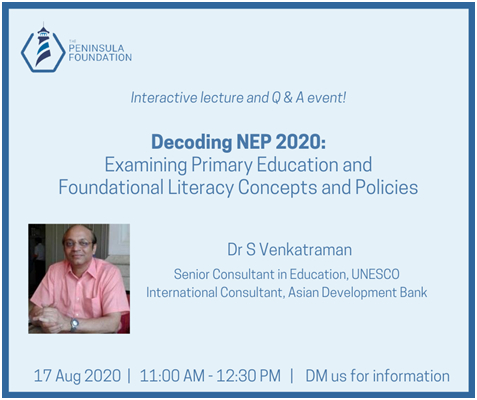Decoding NEP 2020: Examining Primary Education and Foundational Literacy Concepts and Policies

August 17 2020 | The Peninsula Foundation conducted an interactional lecture with Dr. S Venkatraman, Senior Consultant in Education at UNESCO and an International Consultant at the Asian Development Bank, with Air Marshal M Matheswaran moderating the session.
Dr. Venkatraman began by categorising the essential procedures required in the formulation of any policy- Policy formulation, Policy adoption, Budget allocation Project implementation, Evaluation and Monitoring respectively. The resulting policy with compliance to these steps was accentuated by the fact that the National Education Policy was drafted due to pre-existing gaps and issues with the intention of rectifying previous hindrances as well as enhancing the education sector.
A criticism of the document can be made in the department of language used within it, as the educational jargon with which the policy was worded is esoteric in nature and requires elucidation in order to clear the obscurity surrounding it. Jovially, a suggestion provided by the participants was to have a glossary of terms to allude to when one requires insight into the document and its idiosyncratic terms.
At its core, the NEP attempts at creating an environment where education is accessible by all as well as equitable in its dispersion within society as the policy is completely in line with shifting global trends, specifically Access, Equity and Inclusion in the sphere of education. In the document, Sustainable Development Goal number 4 ‘Quality Education’ was used as a reference point as well as an established goal within the document, proving the compliance of the policy with international standards in combating educational impediments as well setting its objectives in tandem with international projections. Dr. Venkatraman proceeded to make the statement that “It is commendable that they deal with the concept of “learn how to learn” but the policy fails to explain what it means” an idea that is ever-present in the language of the policy as it was discussed later.
Apart from the specifics regarding the objective learning and enhancement of cognition through educational reforms, Dr. Venkat shined light upon the idea that “education should also focus on the aspects of personal responsibility, socio-economic situation and society at large” rather than solely on profession. Dr. Venkat also relies on empirical evidence stating that cognitive development is amplified with early education conducted in the mother tongue of the children as experiments suggest the stimulation of brain regions such as cerebral cortex and the prefrontal cortex whilst engaging in speech and learning, therefore providing a scientific basis for the formulation of foundational literacy, and liberalising the curriculum can accommodate this objective along with several others.
In an international study conducted, it was seen that Indian students performed significantly poorly, compared to other nations in the solving of problems such as simple addition and English proficiency of the 2nd grade level. A criticism by Dr. Venkatraman is that India does not include international assessment scales in the education sector, as many countries employ these standardised cognitive testing methodologies. It is imperative for systemic and policy-level changes. In 2019, a Memorandum of Understanding was signed between the MHRD of India and the OECD establishing India’s participation in the Program for International Student Assessment (PISA) in 2021. Dr. Venkatraman says that PISA attempts to address imperative questions with regards to education, that would provide information to amplify educational structures.
Dr. Venkat ended with a final suggestion that the policy requires a Monitoring and Evaluation framework with regards to monitoring closely the effective implementation as well as curtailing challenges whilst executing the policy.
